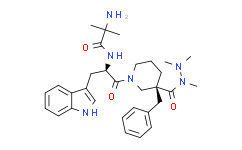| Description: |
Anamorelin is a novel ghrelin receptor agonist with EC50 value of 0.74 nM in the FLIPR assay. |
| Target: |
Ki: 0.7 nM (ghrelin receptor)[1] EC50: 0.74 nM (ghrelin receptor)[1] |
| In Vivo: |
In rats, Anamorelin (ANAM) at an oral dose of 3, 10, or 30 mg/kg once daily significantly increases both food intake and body weight from Day 2 to Day 7 of treatment compared with the vehicle control. The cumulative change in food intake and weight gain increases dose-dependently, and these changes are significant at all dose levels (P<0.05) compared to the control. Administration of Anamorelin at a single oral dose of 3, 10, or 30 mg/kg induces a dose-dependent increase in plasma GH levels and GH AUC0-6h in rats[1]. |
| In Vitro: |
In the FLIPR assay, Anamorelin (ANAM) shows significant agonist activity on the ghrelin receptor, with EC50 value of 0.74 nM. No significant antagonist activity is observed with Anamorelin at concentrations of up to 1,000 nM. In the binding experiments, Anamorelin binds to the ghrelin receptor with a binding affinity constant (Ki) of 0.70 nM. In the competition assay with radiolabeled ibutamoren (35S-MK-677; another ghrelin receptor agonist) Anamorelin (ANAM) is also found to bind with high affinity to the ghrelin receptor (IC50=0.69 nM). In rat pituitary cells incubated with Anamorelin, there is a dose-dependent stimulatory effect on GH release and the potency (EC50) is 1.5 nM. Anamorelin is screened for activity against a set of over 100 receptors, ion channels, transporters, and enzymes. Anamorelin demonstrates binding to the tachykinin neurokinin 2 (NK2) site (IC50=0.021 μM); however, a subsequent NK2 functional assay demonstrates no functional activity[1]. |
| Kinase Assay: |
For the competition assay, Anamorelin (ANAM) concentrations (1 pM-10 μM) are added to the membranes together with 35S-MK-677. Nonspecific binding is determined by adding 10 μM nonlabeled MK-677. The mixture is incubated at 30°C for 60 min, followed by application of the samples to GF/B filters, which has been pretreated with 0.5 % PEI for 60 min. The filters are subsequently washed in 0.9 % NaCl and counted using an OptiPhase counter[1]. |
| Animal Administration: |
Rats[1] For the assessment of food intake and body weight, rats are divided into four groups: Anamorelin 3 mg/kg (n=7), 10 mg/kg (n=7), or 30 mg/kg (n=7), or vehicle control (n=8), and 100 μL blood samples are collected before and 0.25, 0.5, 1, 2, 3, 4, 5, and 6 h after single dosing. Rats are anesthetized with sodium pentobarbital 64.8 mg/kg. A catheter filled with heparinized saline solution is inserted in the left femoral artery for blood collection and fitted with an extension tube, 1 mL sampling syringe, and a three-way cock to allow excess blood to return. Plasma levels of GH are measured immunochemically using a Rat Growth Hormone EIA kit and microplate reader. Measurements are performed in duplicate. Area under the GH concentration curve from 0 to 6 h (AUC0-6h) postdose and the time course of GH plasma concentrations are evaluated. Pig[1] In pigs (n=6 per group), Anamorelin is dosed directly into the gastric lumen via the dosing catheter. Blood samples are collected for the stimulation profile of GH at 30 and 15 min before, and 0, 5, 15, 30, 45, 60, and 120 min following dosing. Animals received either a single dose (3.5 mg/kg), or once-daily administration (1 mg/kg) for 7 days and stimulation profiles are taken after the first and seventh dose of Anamorelin. To assess IGF-1 levels, pigs receive either placebo or Anamorelin for 7 days (1 mg/kg/day), and the following 7 days the two treatments are crossed over. A single blood sample is taken once a day immediately before dosing. |
| References: |
[1]. Pietra C, et al. Anamorelin HCl (ONO-7643), a novel ghrelin receptor agonist, for the treatment of cancer anorexia-cachexiasyndrome: preclinical profile. J Cachexia Sarcopenia Muscle. 2014 Dec;5(4):329-37. |






















